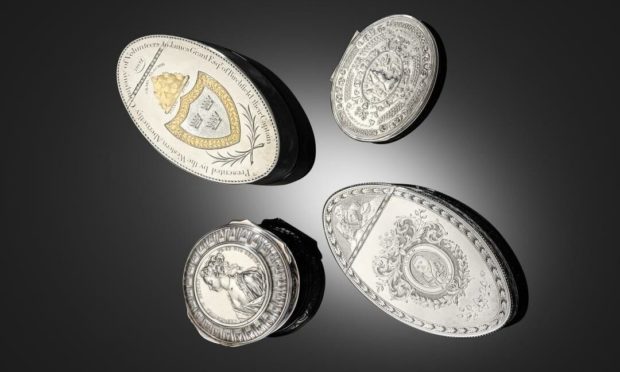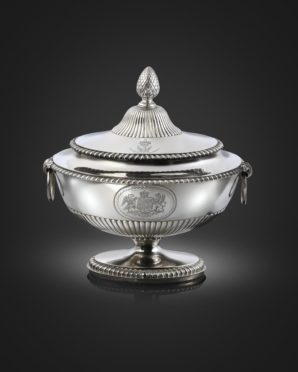A George III silver snuff box presented to landowner, politician and captain “good Sir James” by his battalion will go under the hammer next week.
Sir James Grant, who owned land in Strathspey, raised one of the local units of volunteers following the French Revolution when it seemed war between France and Great Britain was inevitable.
The 8th Baronet of Colquhoun was presented with the inscribed silver box by the men of the Western Abernethy Company of Volunteers in 1798.
It is expected to fetch between £2,000-£3,000 when it goes up for auction on Wednesday.
Sir James first raised a voluntary unit, the Grant Fencibles, almost entirely from his tenantry in 1793.
Their main objective was to provide support in the local area while other forces could tackle more immediate military operations.
The Grant Fencibles was disbanded six years later, and Sir James raised the Strathspey Battalion of Volunteers in 1798. There were two companies, Eastern and Western Abernethy, and he became captain of the 80-strong Western Company.
Collection of rare antique silver boxes
Born in Moray, Sir James succeeded his father as MP for Elginshire in 1761, holding the seat until 1768.
In 1783, he became one of the founders of the Royal Society of Edinburgh. He returned to politics in 1790, serving as MP for Banffshire until 1795, and as Lord Lieutenant of Inverness-shire. He died at the family seat at Castle Grant in 1811 aged 72.
The snuff box, made by Alexander Gardner and Co of Edinburgh in 1802, is valued at between £2,000-£3,000.
It is one of 24 snuff boxes from the Lion Collection, a group of rare examples of antique British silver boxes, which will go under the hammer at the two-day auction at Woolley and Wallis in Salisbury.
The sale will also feature a number of other items of historical Scottish importance. These include a George III silver soup tureen, valued at £3,000-£4,000, which bears the crest of St Clair, Earls of Rosslyn is also up for auction.
A Scottish silver-mounted hardstone inkwell in the shape of a curling stone is also expected to gain some interest, as the sport was invented in medieval Scotland. The Victorian novelty item, bearing a crest attributed to Bendyshe, Cramer, Doran and more is inscribed “From G and F.C”.
Another item from the Lion Collection, an 18th century Scottish provincial snuff mull, made by Robert Anderson of Inverness around 1760 is also for sale.

